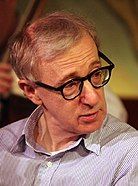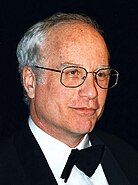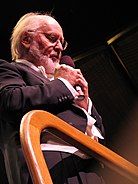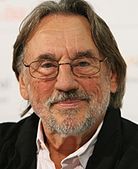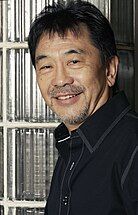50th Academy Awards
| 50th Academy Awards | |
|---|---|
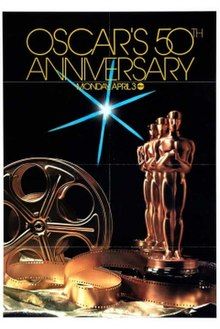 Official poster | |
| Date | April 3, 1978 |
| Site | Dorothy Chandler Pavilion, Los Angeles, California, U.S. |
| Hosted by | Bob Hope |
| Produced by | Howard W. Koch |
| Directed by | Marty Pasetta |
| Highlights | |
| Best Picture | Annie Hall |
| Most awards | Star Wars (6) |
| Most nominations | Julia, Star Wars & The Turning Point (11) |
| TV in the United States | |
| Network | ABC |
| Duration | 2 hours, 55 minutes[1] |
| Ratings | 48.5 million 36.3% (Nielsen ratings) |
The 50th Academy Awards ceremony, presented by the Academy of Motion Picture Arts and Sciences (AMPAS), honored films released in 1977 and took place on April 3, 1978, at the Dorothy Chandler Pavilion in Los Angeles. During the ceremony, AMPAS presented Academy Awards (commonly referred to as Oscars) in 22 categories. The ceremony, televised in the United States by ABC, was produced by Howard W. Koch and was directed by Marty Pasetta.[2] Actor and comedian Bob Hope hosted the show for the 19th time.[3] He first presided over the 12th ceremony held in 1940 and had last served as a co-host of the 47th ceremony held in 1975.[4] Five days earlier, in a ceremony held at The Beverly Hilton in Beverly Hills, California, on March 29, the Academy Scientific and Technical Awards were presented by hosts Kirk Douglas and Gregory Peck.[5]
Annie Hall won four awards, including Best Picture. Other winners included Star Wars with six awards, Julia with three, and Close Encounters of the Third Kind, The Goodbye Girl, Gravity Is My Enemy, I'll Find a Way, A Little Night Music, Madame Rosa, The Sand Castle, Who Are the DeBolts? And Where Did They Get Nineteen Kids?, and You Light Up My Life with one. In addition, Close Encounters of the Third Kind and Star Wars were each presented with an additional Special Award. The telecast garnered 48.5 million viewers in the United States.
Winners and nominees
[edit]The nominees for the 50th Academy Awards were announced on February 21, 1978. Julia and The Turning Point tied for the most nominations with eleven each.[6] The winners were announced during the awards ceremony on April 3. Woody Allen became the first person to receive nominations for acting, directing, and screenwriting for the same film since Orson Welles, who previously achieved this feat for 1941's Citizen Kane.[7] With its 11 nominations and zero wins, The Turning Point was the most nominated film in Oscar history without a win.[a] By virtue of her win for her role as the titular character in Julia, Vanessa Redgrave became the first and only performer to win in a supporting acting category for playing a titular role.[9]
Awards
[edit]Winners are listed first, highlighted in boldface and indicated with a double dagger (‡).[10]
Academy Honorary Awards
[edit]- Margaret Booth – "For her exceptional contribution to the art of film editing in the motion picture industry."[16]
Jean Hersholt Humanitarian Award
[edit]The award recognizes individuals whose humanitarian efforts have brought credit to the motion picture industry.[17]
Irving G. Thalberg Memorial Award
[edit]The award honors "creative producers whose bodies of work reflect a consistently high quality of motion picture production".[18]
Special Achievement Awards
[edit]- Ben Burtt for the creation of the alien, creature and robot voices in Star Wars[16]
- Frank Warner for sound effects editing in Close Encounters of the Third Kind[16]
Multiple nominations and awards
[edit]
|
|
Presenters and performers
[edit]The following individuals (in order of appearance) presented awards or performed musical numbers:[19]
Presenters
[edit]Performers
[edit]| Performer | Role | Performed |
|---|---|---|
| Nelson Riddle | Musical arranger and conductor | Orchestral |
| Debbie Reynolds | Performer | "Look How Far We've Come" |
| Debby Boone | Performer | "You Light Up My Life" from You Light Up My Life |
| Gloria Loring | Performer | "Candle on the Water" from Pete's Dragon and "Someone's Waiting for You" from The Rescuers |
| Sammy Davis Jr. Marvin Hamlisch |
Performers | "Come Light the Candles" during a tribute honoring Richard Carlson, Zero Mostel, Peter Finch, Joan Crawford, Bing Crosby, Elvis Presley, Groucho Marx, and Charlie Chaplin[21] |
| Aretha Franklin | Performer | "Nobody Does It Better" from The Spy Who Loved Me |
| Jane Powell | Performer | "The Slipper and the Rose Waltz (He Danced with Me)" from The Slipper and the Rose |
| Academy Awards Chorus | Performers | "That's Entertainment" |
Ceremony information
[edit]
In December 1977, the Academy announced that actor and comedian Bob Hope was chosen to host the 1978 ceremony. As a result of his selection, he became the first person to emcee the Oscars gala solo since the 40th ceremony held in 1968. Oscars gala producer Howard W. Koch explained his decision to hire Hope as host, stating, "The multiple emcee system of recent years is a good one, but we decided this year's show called for a single master of ceremonies. And we couldn't think of anyone better suited for the role than Bob Hope."[22]
In celebration of the fiftieth anniversary of the Academy and the Oscars, AMPAS hosted a dinner reception at the Los Angeles Biltmore Hotel on May 11, 1977. The gala, which Hope also hosted, took place in the same spot as the organization's first meeting, exactly 50 years later.[23] ABC also aired specials prior to the ceremony, highlighting the history of the awards.[24]
Vanessa Redgrave's speech
[edit]Prior to the ceremony, Vanessa Redgrave's Best Supporting Actress nomination was met with controversy due to her recent involvement with The Palestinian, a documentary chronicling the activities of the Palestine Liberation Organization (PLO).[25] The film garnered controversy from several Jewish groups for its anti-Israel commentary.[26] Outside of the Dorothy Chandler Pavilion on the day of the ceremony, Jewish Defense League protestors burned a statue of the actress, while counter-protestors waved Palestinian flags.[27] After paying tribute to writer Lillian Hellman and the titular character of Julia for which she won the Best Supporting Actress award, Redgrave remarked in her acceptance speech, "And I salute you, and I pay tribute to you, and I think you should be very proud that in the last few weeks you've stood firm, and you have refused to be intimidated by the threats of a small bunch of Zionist hoodlums." She concluded her speech stating, "I salute you and I thank you and I pledge to you that I will continue to fight against Antisemitism and fascism." The comments received both applause and booing amongst the audience.[28] Later during the ceremony, screenwriter Paddy Chayefsky prefaced his presentation of the screenplay awards, saying, "I would like to suggest to Miss Redgrave that her winning an Academy Award is not a pivotal moment in history, does not require a proclamation and a simple ‘Thank you’ would’ve sufficed."[27]
Critical reviews
[edit]Los Angeles Times film critic Charles Champlin wrote, "The Oscar show as a show had more of what it has recently been short of, which is the presence of authentic film stars. It had refreshingly less of what it has sometimes had too much of, which is awkward and underrehearsed cross-talk."[29] Columnist Aaron Gold of the Chicago Tribune remarked, "Howard Koch and Allan Carr deserve Oscars for the work they did in creating an exciting and glamorous show, as they promised. Master of ceremonies Bob Hope... brought the air of dignity and continuity to the show that it lacked last year."[30] The News & Observer entertainment columnist commented, "If the evening was never as nimble as a dance by Fred Astaire, it was jam-packed with nostalgia, suspense, laughter, a few tears, and production numbers as striking as anything in Oscar's history."[1]
John Huddy of the Miami Herald observed, "The Redgrave-Chayevsky exchange enlivened a long Oscar night in which there were too many silly songs, too many special awards that nobody gave a hoot about, and too many dreary acceptance speeches by obscure if talented short-subject makers."[31] The Arizona Republic columnist Mike Petryni wrote, "Produced this year by Howard Koch, who incidentally co-wrote Casablanca, the show seemed, as usual, rather dull, draggy and sluggish.[32]
Ratings and reception
[edit]The American telecast on ABC drew in an average of 48.5 million people over the length of the entire ceremony, which was a 22% increase from the previous year's ceremony.[33] Moreover, the show drew higher Nielsen ratings compared to the previous ceremony, with 36.3% of households watching with a 68% share.[34] Additionally, the ceremony presentation received five nominations at the 30th Primetime Emmys, but failed to win any of its nominations.[35]
See also
[edit]Notes
[edit]- ^ The Color Purple later equaled this record with 11 nominations and no wins, in 1986.[8]
References
[edit]- ^ a b Morrison, Williams (April 5, 1978). "Worm-Like Golden Oscar Finally Turns". The News & Observer. p. 10.
- ^ Osborne 2013, p. 413
- ^ Lang, Derek J. (November 11, 2011). "Billy Crystal Returning to Host the Oscars". NBC News. Retrieved March 23, 2022.
- ^ Dorsey, Tom (April 3, 1978). "Oscar: The Story". Courier Journal. p. C1.
- ^ "Past Scientific & Technical Awards Ceremonies". Academy of Motion Picture Arts and Sciences. Archived from the original on February 13, 2014. Retrieved July 31, 2013.
- ^ Harmetz, Aljean (February 22, 1978). "Woody Allen Is Up For Three Oscars". The New York Times. Retrieved August 22, 2021.
- ^ Wiley & Bona 1996, p. 1126
- ^ Holden 1993, p. 252
- ^ Osborne 2013, p. 242
- ^ "The 50th Academy Awards (1978) Nominees and Winners". Academy of Motion Picture Arts and Sciences. Archived from the original on November 11, 2014. Retrieved October 5, 2011.
- ^ Dagan, Carmel (May 10, 2019). "Alvin Sargent, Oscar-Winning 'Julia' and 'Ordinary People' Screenwriter, Dies at 92". Variety. Retrieved August 27, 2024.
- ^ Pedersen, Erik (June 6, 2016). "Peter Shaffer Dies: Oscar-Winning Amadeus Writer Was 90". Deadline Hollywood. Retrieved March 23, 2024.
- ^ Barnes, Mike (June 23, 2020). "Lewis John Carlino, Writer and Director of The Great Santini, Dies at 88". The Hollywood Reporter. Retrieved August 27, 2024.
- ^ "Writer Avery Corman to Speak at Muhlenberg". The Morning Call. September 22, 1994. Retrieved March 23, 2024.
- ^ Calhoun, Ada (June 9, 2020). "That Obscure Object of Desire". The Austin Chronicle. Retrieved August 24, 2024.
- ^ a b c d e Franks 2005, p. 246
- ^ "Jean Hersholt Humanitarian Award". Academy of Motion Picture Arts and Sciences. Archived from the original on November 16, 2020. Retrieved November 12, 2020.
- ^ "Irvin G. Thalberg Memorial Award". Academy of Motion Picture Arts and Sciences. Archived from the original on January 1, 2016. Retrieved December 18, 2015.
- ^ Wiley & Bona 1996, p. 547
- ^ Terrance 2013, p. 14
- ^ Wiley & Bona 1996, p. 548
- ^ "Bob Hope to Do Oscars Alone". The Philadelphia Inquirer. December 11, 1977. p. 24-F.
- ^ Kilday, Gregg (May 13, 1977). "Motion Picture Academy Fete". Los Angeles Times. p. 94.
- ^ Osborne 2013, p. 202, 204
- ^ "Oscar Protest". The Guardian. March 18, 1978. p. 6.
- ^ Multiple sources:
- Shepard, Richard F. (November 10, 1977). "Redgrave Film on P.L.O. Stirs a Controversy". The New York Times. Retrieved March 23, 2023.
- "Jewish Group Angry at Actress". The Albuquerque Tribune. February 16, 1978. p. C-8.
- Harmetz, Aljean (June 16, 1978). "Theater for Redgrave Film Bombed". The New York Times. Retrieved March 23, 2023.
- ^ a b Fretts, Bruce (January 11, 2019). "Oscars Rewind: The Most Political Ceremony in Academy History". The New York Times. Retrieved March 23, 2023.
- ^ Wiley & Bona 1996, p. 550
- ^ Champlin, Charles (April 5, 1978). "Redgrave's Rhetoric Not a Factor in Voting". Los Angeles Times. p. 87.
- ^ Gold, Aaron (April 5, 1978). "Tower Ticker". Chicago Tribune. p. 19.
- ^ Huddy, John (April 5, 1978). "The Redgrave Flap Gave the Oscars Sizzle". Miami Herald. p. 9-B.
- ^ Petryni, Mike (April 4, 1978). "Awards Show Gets No Oscar". The Arizona Republic. p. B-11.
- ^ "Top-10 Most-Watched Academy Awards Broadcasts". Nielsen Media Research. Retrieved March 23, 2023.
- ^ "50th Anniversary Oscar Show Leads the Nielsen Ratings". Los Angeles Times. April 12, 1978. p. 83.
- ^ "50th Annual Awards of the Academy of Motion Picture Arts and Sciences". Academy of Television Arts & Sciences. Retrieved March 23, 2020.
Bibliography
[edit]- Franks, Don (2005), Entertainment Awards: A Music, Cinema, Theatre and Broadcasting Guide, 1928 through 2003 (3rd ed.), Jefferson, North Carolina, United States: McFarland & Company, ISBN 978-1-5791-2396-3
- Holden, Anthony (1993), Behind the Oscar: The Secret History of the Academy Awards, New York, New York, United States: Simon & Schuster, ISBN 978-0-6717-0129-1
- Osborne, Robert (2013). 85 Years of the Oscar: The Complete History of the Academy Awards. New York, New York, United States: Abbeville Publishing Group. ISBN 978-0-7892-1142-2. OCLC 856879222.
- Terrance, Vincent (2013). Television Specials: 5,336 Entertainment Programs, 1936–2012 (5 ed.). Jefferson, North Carolina, United States: Ballantine Books, McFarland & Company. ISBN 978-1-4766-1240-9. OCLC 844373010.
- Wiley, Mason; Bona, Damien (1996), Inside Oscar: The Unofficial History of the Academy Awards (5 ed.), New York, New York, United States: Ballantine Books, ISBN 978-0-3454-0053-6, OCLC 779680732
External links
[edit]- Academy Awards official website
- The Academy of Motion Picture Arts and Sciences official website
- Oscars' channel on YouTube run by the Academy of Motion Picture Arts and Sciences
- Analysis
- Other resources

